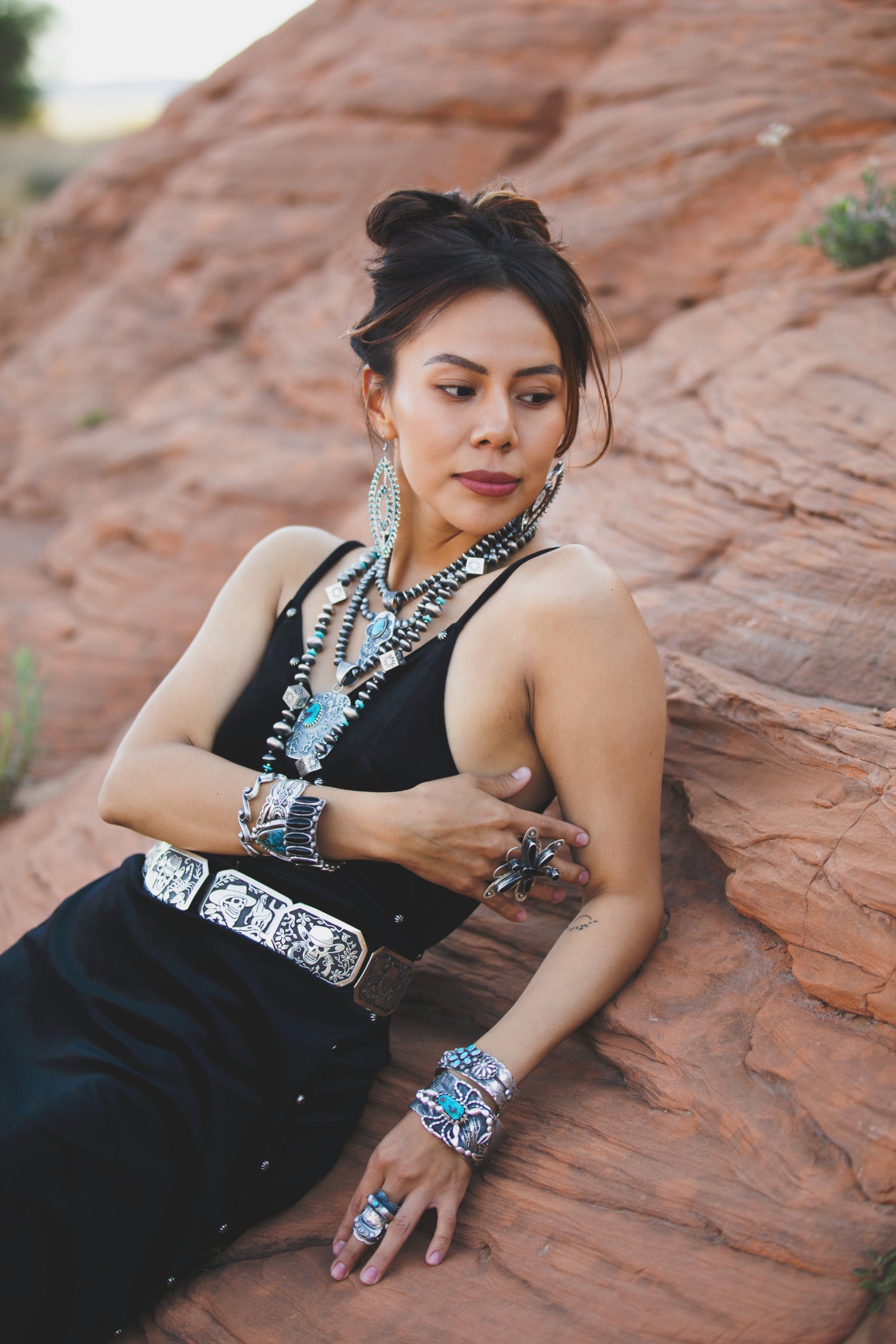“I wanted to be where I was born, where I was at, a Navajo silversmith.”
It was the summer of 1949 in the high mountains of the Chuska range. A young Navajo boy sat on an upturned bucket, watching his grandfather melt silver coins in a clay crucible. The grandfather was teaching the six year old the art of jewelry making. The Navajo silversmith knelt on the earthen floor in front of his fire, melting the coins for a tufa cast bracelet; a jewelry process which involved carving out a pattern in tufa stone, lining the mold with a bit of sheep grease, then pouring the liquid silver in.
The grandfather's workshop was small and spare: the walls constructed of wooden boards lined with cardboard insulation, covered on the outside with adobe mud. The roof shingles were made from cut up lard cans. The grandfather's forge was a functional unit fashioned from an old army water can, and his treasured goatskin bellows once belonged to his father. The main work table was a large tree stump with a leather strap circling round. The grandfather would sit on a small pine bench with his knees pressed tightly around the stump. His tools of hammer, chisels, pliers, scissors and awl hung from the leather strap within easy reach. Off to the side was a long table with soldering tools, a box of Borax, handmade stamps, turquoise stones and various sandpapers for burnishing the silver to a high lustre. In this way the elderly man worked for hours, pounding out silver to a workable gauge, stamping patterns, filing, soldering, chiseling and polishing.
When the boy and his grandfather went off to herd sheep they still made jewelry. In the early spring the grandfather would pack a four inch piece of railroad track into his saddlebag and ride to a mountain watering spot. Once there he'd unload the heavy piece of steel. That way when he and the boy were in the area, with the sheep resting and drinking, the grandfather could stamp silver on his railroad anvil. Or if the sheep were roaming about he'd use dense tree stumps for a hard surface. The boy was always happy when his grandfather made jewelry, because he knew that when he had a finished piece, he'd take it to a trader and return home with new shoes, shirts or pants for the family. Or he might barter with a Navajo weaver for a thick saddle blanket.
Navajo Silversmith at Gallup Inter-Tribal Ceremonial
As the boy grew older he looked forward to the the family's annual August trek down the mountain to attend the Gallup Inter-Tribal Ceremonial. This was in the day when the Ceremonial was held on the north side of town. Native people traveled in wagons from far and wide for a week long celebration of song, pageantry, trading, camaraderie and dance. Families were paid in silver dollars to perform for the throngs of tourists: $7.00 for daytime parades, $14.00 for night performances. In this way the young man was able to collect a good number of coins. Then he and his friends would set the coins on the railroad tracks to be flattened by a passing train, saving many hours of hammering. How they managed to get the coins off the tracks before they were squashed too thin remains a mystery. It was also at the Ceremonial that the grandfather traded with the Santo Domingo tribe for turquoise. “We traded mutton for stone. We were humble then. It was just people to people. It was love.”
When the boy grew to manhood with a wife and children of his own he moved south to Silver City. There he set up a modern jewelry workshop and ran a small assembly line. Three men alternated with casting, cutting, making bezels, setting stones, twisting wire, stamping and polishing. The production line was profitable, but spiritually unrewarding, and soon enough the man was back among his people, carrying on his grandfather's legacy as a Navajo silversmith, cherishing his memory, his teachings and his tools.

